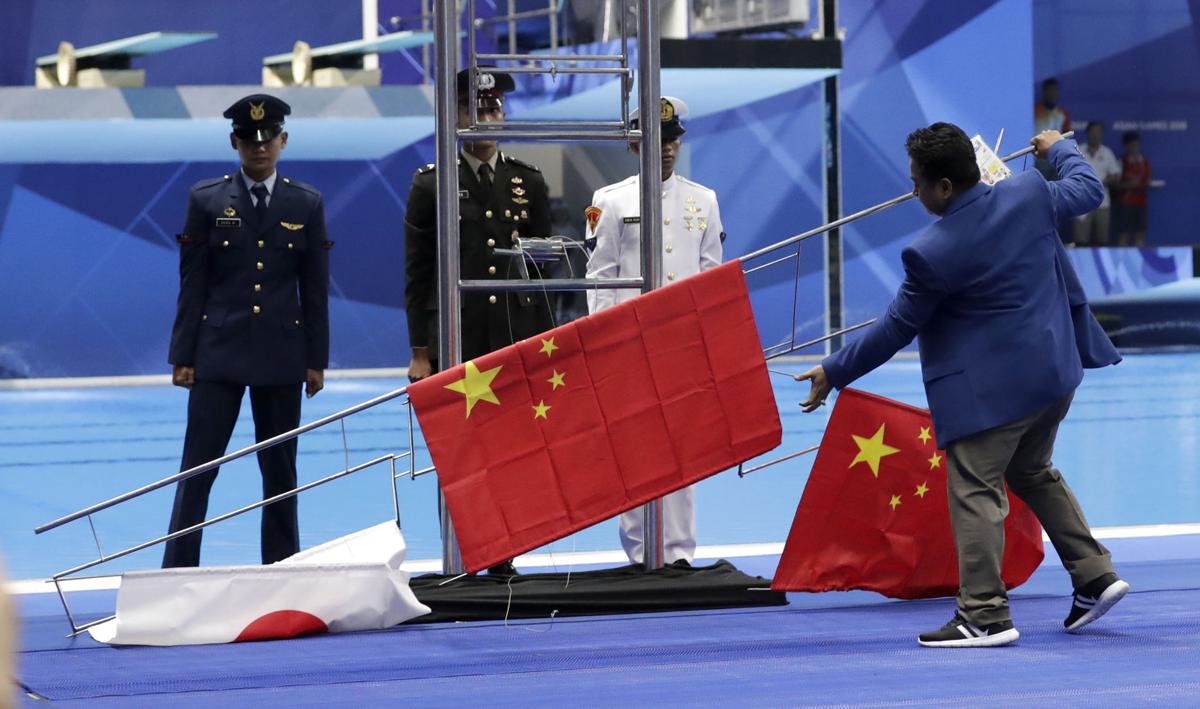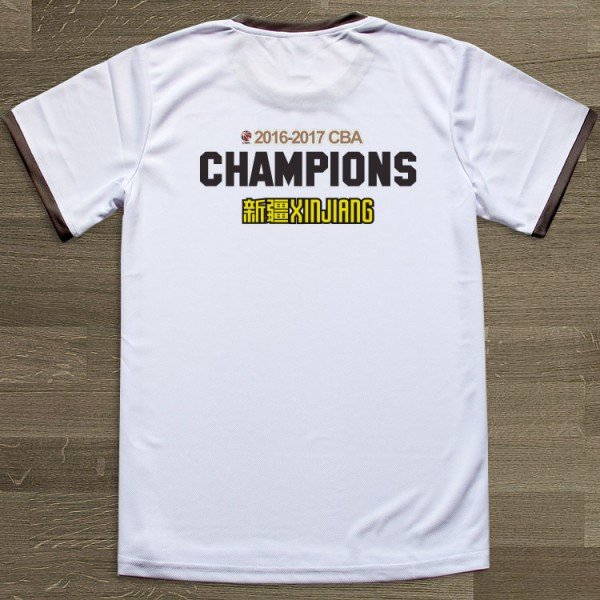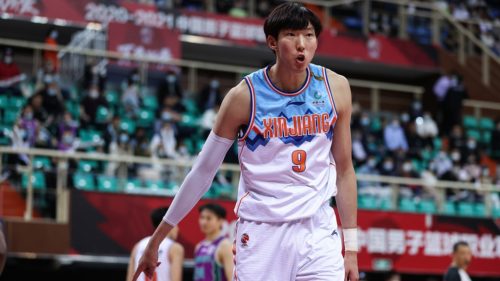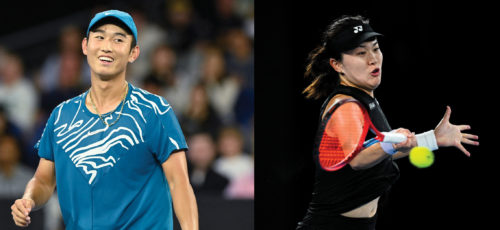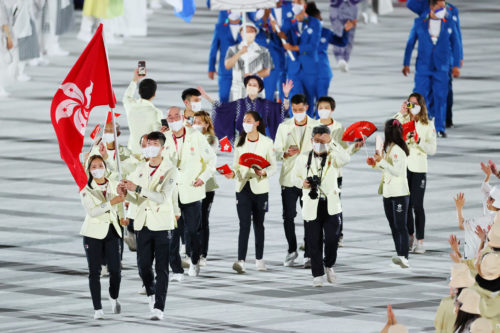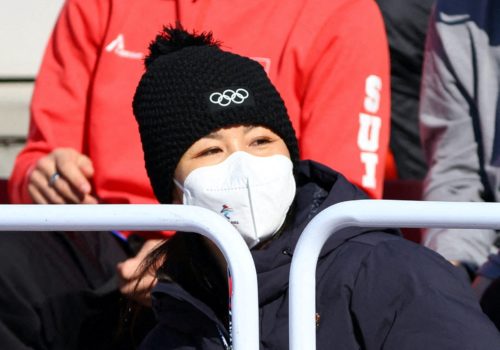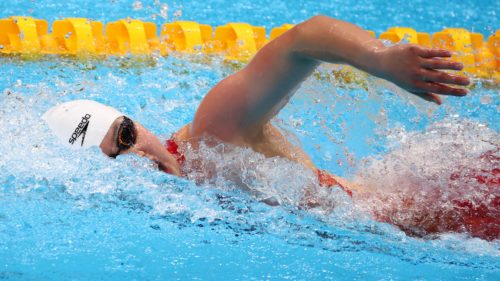Asian Games update (including Wang Shanshan’s nine-goal game), and the NBA in Xinjiang
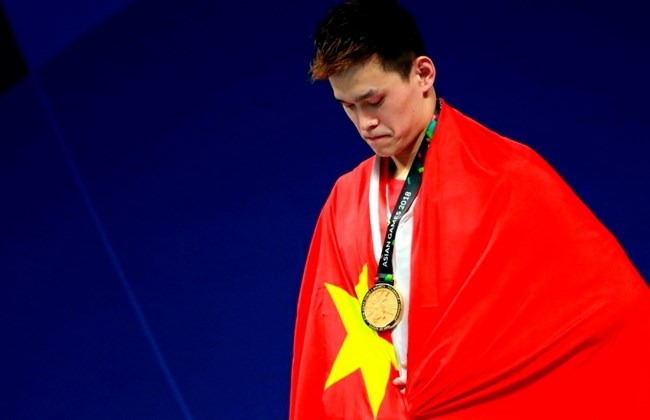
The China Sports Column is a The China Project weekly feature in which China Sports Insider Mark Dreyer looks at the week that was in the China sports world.
It’s been a busy week in the world of sports…
Sun Yang — the bad boy of swimming — has been at it again, just days after his coach told us how much of a softie he is once you get to know him. Sun is the greatest swimmer in China’s history — and arguably the best-known (active) athlete in the country — but he’s repeatedly clashed with officials over his personal sponsorship commitments.
Some of this is perfectly understandable. Tennis player Li Na was allowed to leave the state system, choose her own coaches, set her own schedule, and, crucially, keep the majority of her prize money. That led to more success on the court — and a raft of sponsorships off it — that still pays her millions even after her retirement. But swimming has been far less progressive a sport, with Sun still tightly controlled by national team officials, with flash points arising when the Chinese team signs with one sponsor, while Sun himself wants to sign an endorsement deal with a rival.
But on other occasions, he’s really shot himself in the foot. While under contract to Hyundai, for example, Sun was pictured driving both a Porsche and Audi. What’s more, he was caught with the Porsche only because he crashed it while driving without a license, and ended up pissing off fellow inmates during 10 days in detention.
Meanwhile, at the ongoing Asian Games, Sun is on his way to completing a clean sweep of the middle and long-distance freestyle events — four in all — while also picking up a couple of silver medals in the relay events, but all the talk has been on his post-race behavior. Standing on the podium after winning the men’s 200-meter freestyle, he wore a top made by his personal sponsor 361°, rather than the mandated one by team sponsor Anta — a big no-no at major sporting events. Another talking point was that he demanded the anthem be played a second time after the three flags fell down toward the end of the initial playing, although that generally won him support among his many Chinese fans.
After taking a fair bit of heat for his branding actions — with an Anta statement even implying that Sun had let his country down — he turned up on the podium after winning gold No. 2 and purposely draped the Chinese flag over his shoulders to cover the Anta logo — reminiscent of Michael Jordan from the 1992 Olympics — before holding a mascot in front of the logo during the ceremony for gold No. 3. A fourth gold followed in the 1,500m on Friday night, with Sun again employing the mascot routine on the podium.
Meanwhile, fellow Chinese swimmer Liu Xiang (not to be confused with the hurdler) has had everyone talking about her world-record swim in the 50m backstroke, but Sun’s own medal achievements have been kept firmly in the background. He’s won three Olympic titles across two Games, with more likely to follow in Tokyo in 2020, but unless he can truly transform into the “softie” his coach says he is, expect the attention to center on anything but swimming.
~
https://youtu.be/UOqlmK-ahXU?t=5m15s`
Performance of the week undoubtedly has to go to female soccer star Wang Shanshan, who played the final 34 minutes of China’s 16-0 win over Tajikistan at the Asian Games and scored nine goals — yes, that’s three hat tricks in little over half an hour. She’s also scored in each of China’s other two Asian Games matches, notching 11 goals in total in Indonesia. Some have even joked she could be due a call-up to the men’s team.
Due to the uneven standard of the teams, North Korea actually matched China’s 16-0 performance against Tajikistan and then scored more against Hong Kong — 8 goals to China’s 7 — but a 2-0 win for China over North Korea saw them top the group. A weak Thailand side awaits on Saturday in the quarterfinals, after which China will be set for a tasty semifinal against Taiwan on Tuesday.
~
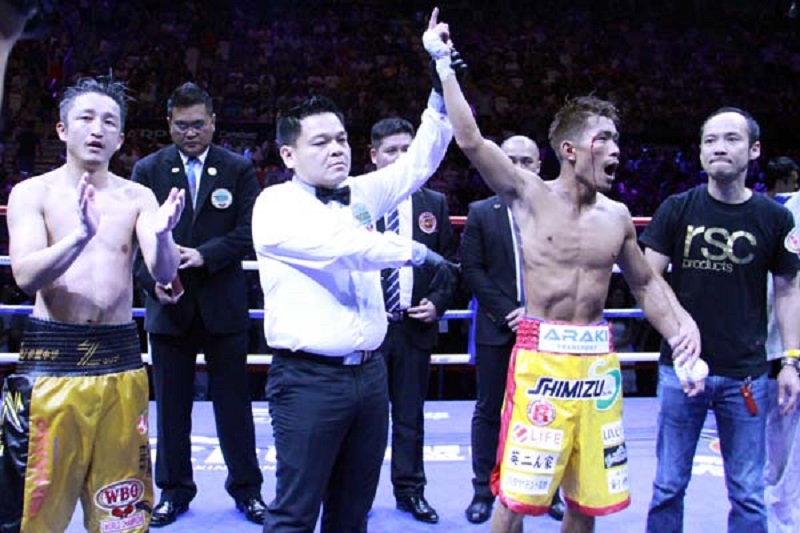
Two-time Olympic boxing champion Zou Shiming has been in the news this week, but, for once, he’s been overshadowed by his wife. Following a stellar Olympic career, Zou turned professional amid predictions that he would change the global face of the sport — but in fact his mismanaged career ended with forced retirement due to a serious eye injury suffered in the ring.
He did win the WBO flyweight title in 2016, but, in his first defense of the belt, lost to unfancied Japanese boxer Sho Kimura. However, he remains China’s most famous boxer and has spearheaded boxing’s efforts to crack the local market.
The WBC — one of the big four boxing organizations that govern the sport globally — has been keen to capitalize on this and presumably tried to convince Zou to become their China head. When that didn’t work, they turned to his wife Ran Yingying, who accepted.
Announcing the new China head of @WBCBoxing: Ran Yingying (wife of Chinese boxer Zou Shiming). pic.twitter.com/CkcnAqsHo3
— Mark Dreyer (@DreyerChina) August 22, 2018
OK, so Ran may actually have been the WBC’s first choice, but her qualifications don’t appear to amount to much more than being Zou’s No. 1 fan. She was also rumored to be the force behind her husband dropping both his promoter and his trainer before his ill-fated loss to Kimura. Let’s hope this move turns out better.
~
Finally, this piece in Slate — titled “Why Is the NBA in Xinjiang?” — dumped on the NBA simply due to the fact that they operate a development and training center in Xinjiang. The intro describes the situation in Xinjiang as “one of the world’s worst humanitarian atrocities,” quickly followed up by references to “concentration camps,” “torture,” and “genocide,” with the author calling the NBA’s presence in the region “shameful” in a tweet.
The China Project published an excellent explainer this week on the abuses currently being perpetrated in Xinjiang, a place where there are very real problems. But the fact that the NBA was singled out for criticism in Slate’s article seems to amount to little more than clickbait.
The league first set up a training center in Urumqi in October 2016 — long before any reports of re-education camps started to emerge — but the author equates the NBA’s engagement in Xinjiang with the claim that it “helps legitimize the repression against Uighurs,” which seems a stretch, to say the least.
Given that the international response to the situation has been largely nonexistent and nearby Muslim countries have been quiet, it’s hard to believe that there aren’t more legitimate targets in this sorry saga than the sport of basketball.
The one fair question asked, though, is whether the NBA will indeed stay in Xinjiang, with abuses there finally starting to make frontpage news in the U.S., especially given the league’s principled stance on a number of social issues.
Given China’s predilection for tit-for-tat measures in the ongoing U.S.-China trade war, a closure of the NBA center could do far more damage to the league’s presence in China than simply irritating sports regulators, as the author muses might happen.
It wouldn’t be surprising if the NBA does indeed decide to quietly relocate this center if international scrutiny on the region continues to grow. But let’s not deny the positive work the league has done in China, or condone the rhetoric that the NBA is continuing “to help China whitewash a network of concentration camps.”
Some further reading:
- The FT blows the lid off the Hong Kong Jockey Club’s charity largesse.
- “Little Wife” and “Busty”: a look at footballers’ nicknames on the Chinese internet.
- A Chinese coach is sent home from the Wheelchair Basketball World Championships after hitting one of his female players.
- The Anthony Modeste saga takes another twist, as another CSL player looks to leave China.
The China Sports Column runs every Friday on The China Project. Follow Mark Dreyer @DreyerChina
